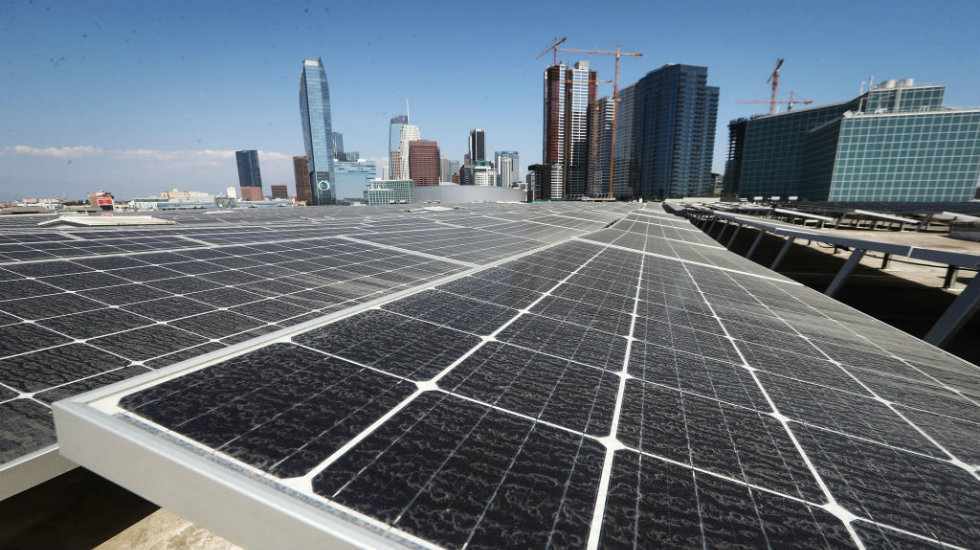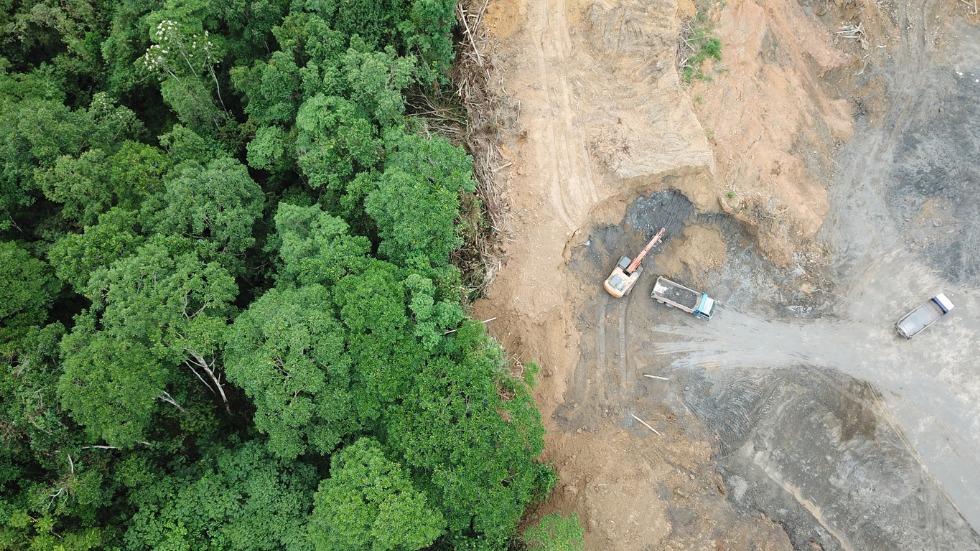Equilibrium/Sustainability — Minivans to go electric, and seek out new fans

Today is Thursday. Welcome to Equilibrium, a newsletter that tracks the growing global battle over the future of sustainability. Subscribe here: digital-stage.thehill.com/newsletter-signup.
The brand that has long shepherded American moms — and dads — to the sweat-filled sidelines of children’s soccer games and performing arts recitals is planning to develop an all-electric version of its trademark minivan.
Chrysler CEO Chris Feuell recently announced plans to launch an electric minivan, as part of a broad slate of new vehicles that will include four new electric Chryslers by 2028, CNET reported. This minivan may also evolve into a “multi-purpose vehicle” in attempt to pivot away from obsolete conventions, Feuell told MotorTrend.
“While she appreciates the value in Chrysler’s reputation as the family brand, she’d like to expand the tent to more than families with young children,” MotorTrend reported, after speaking to Feuell. “She wants a vehicle that works for and appeals to any type of family you’re a part of, not just the outdated ‘soccer mom’ stereotype.”
Today we’ll turn to California, where celebrities, activists and electric vehicle enthusiasts alike are battling a proposal that could cut solar rooftop subsidies that provide residents with significant savings. Then we’ll look at whether deforestation is as big a threat to the U.S. financial system as carbon emissions — and what to do about it.
For Equilibrium, we are Saul Elbein and Sharon Udasin. Please send tips or comments to Saul at selbein@digital-stage.thehill.com or Sharon at sudasin@digital-stage.thehill.com. Follow us on Twitter: @saul_elbein and @sharonudasin.
Celebrities rally to save rooftop solar subsidy

Elon Musk, basketball legend Bill Walton and actors Edward Norton and Mark Ruffalo were among the celebrities to speak out on Wednesday against a California proposal that would slash subsidies for rooftop solar systems, Bloomberg reported.
First words: “Bizarre anti-environment move by govt of California,” Musk wrote, while retweeting a Tesla Silicon Valley Club post that asked area Tesla owners to act on the issue.
What, exactly, is the issue? Some 1.3 million Californians today are able to sell excess rooftop solar generation back to utilities through the electricity grid and receive credits on their bills through the Net Energy Metering program, according to The San Diego Tribune. California has not updated this rule since January 2016.
But in December, the California Public Utilities Commission (CPUC) released a lengthy proposal that would bring a laundry list of changes to this system, the Tribune reported.
The changes include:
- Lower payments to solar customers who send power to the grid. Instead of getting the retail rate, they would get paid what’s called an “actual avoided cost,” which is significantly lower, the Tribune reported.
- A “grid participation charge” of $8 per kilowatt on residential — but not commercial — solar systems. Because typical rooftop solar systems are 5-6 kilowatts, the charge would amount to $40-48 per month in San Diego, according to the Tribune.
CPUC justified the latter revision with the fact that the average Californian who does not have rooftop solar pays about $100 monthly for grid access, the Tribune reported.
Tesla owners called to action: The Tesla Silicon Valley Club has appealed to area Tesla owners to “tell Governor [Gavin] Newsom [D] and the CPUC to reject the proposed solar tax and retroactive changes to existing solar customers.”
The message accused CPUC of “bowing to pressure from California utilities,” adding that the proposal would make Californians pay the highest solar fees in the country, according to a report from the Solar Builder trade magazine.
The utilities blamed in Tesla’s message include Pacific Gas and Electric Company (PG&E), Southern California Edison (SCE) and San Diego Gas & Electric (SDG&E).
NORTON, RUFFALO AND WALTON WEIGH IN
Norton — most well-known for his role in Fight Club and American History X — called upon Californians “to get loud about this” in a Twitter post.
“This is truly a moment of truth & choice between an American Renewal, characterized by the technological innovation & entrepreneurial dynamism that made this country a powerhouse or remaining shackled to broken & dirty system,” he tweeted.
Ruffalo, meanwhile, posted a flyer from the California Solar & Storage Association, which asks Californians to join a “Save Our Solar Jobs Rally” in San Francisco and Los Angeles on Thursday.
Walton, basketball hall-of-famer and longtime solar advocate, sent a letter to Newsom asking him to reject the CPUC’s proposal, according to Bloomberg.
What does the governor have to say? Newsom agreed that changes were needed to state’s proposal to reduce rooftop solar incentives, at a Monday state budget press conference, Bloomberg Quint reported.
“We still have some work to do,” Newsom said.
What’s next? While the CPUC had been scheduled to listen to oral arguments about the plan at a Wednesday hearing, those arguments were postponed to an unspecified later date, a spokesman for the Environmental Working Group (EWG) confirmed to Equilibrium.
Accusations of “giveaway” and “gouging” “Gov. Newsom simply cannot allow this giveaway from state regulators to utilities – at the expense of California’s consumers and climate – to go forward on his watch and define his record on climate change,” Ken Cook, EWG president and a California resident, said in a statement.
Cook stressed that consumers are being “gouged this winter by skyrocketing energy costs” and fees to pay for wildfires “caused by PG&E and other utilities.”
The CUPC proposal, he argued, is only “meant to increase profits for the utilities and crush the only competition they now face” — Californian rooftop customers.
Last words: “We welcome the governor’s comments and respectfully urge him to use his voice and full authority to stop the ill-conceived plan,” Cook added.
Deforestation poses risk to financial system

A new report finds that U.S. banks are actively funding a global epidemic of deforestation and land degradation that puts the nation’s financial stability at risk.
That means the Biden administration needs to bring the same attention to curbing global deforestation as it has brought to cutting the risk from fossil fuel emissions — or invite a creeping economic collapse, consultancy firm Climate Advisers argued in the report.
First words: “It is clear that the financial sector’s ties to deforestation should receive the same level of attention as overseas financing of fossil fuels,” the authors wrote.
“Action by the Biden administration, the Federal Reserve, and the Securities and Exchange Commission could have out-sized climate benefits, while protecting US investors from unmitigated risk,” they added.
An existing tailwind: The Biden administration has repeatedly flagged the risk that climate change — and the economic transition off fossil fuels — poses to the nation’s economic stability.
Last May, President Biden signed an executive order directing the federal government to develop “consistent, clear, intelligible, comparable, and accurate disclosure of climate-related financial risk,“ The Hill reported.
He signed another executive order demanding an end to federal funding for overseas coal plants in December, a month after the administration joined a global pledge to end deforestation by 2030.
But thus far, these initiatives have proceeded down parallel, unconnected tracks — leaving investors in the dark about the risky businesses they may be investing in, the Climate Advisers report argued.
DOMESTIC RISKS OF FOREIGN DEFORESTATION
For a temperate country, the U.S. economy is surprisingly reliant on products that come from tropical forests. U.S. importers brought in $618 billion in tropical commodities in 2020, with $76 billion of that in agricultural commodities — a trade that impacts nearly 40 percent of the American economy, according to Climate Advisers.
Much of this danger is direct: The threat involves goods and services that tropical forests provide, and that U.S. consumers and companies rely on, from chocolate and coffee to rain and cutting-edge pharmaceuticals.
But this only scratches the surface: Atmospheric rivers — flowing regions of the atmosphere that transport water vapor — that , according to NASA.
Ecosystem services at risk: And half the world’s gross domestic product — about $44 trillion in economic value — depends “moderately or highly” on nature, according to a 2020 study by the World Economic Forum. The agricultural sector — the primary culprit in deforestation and soil erosion — is also “among the most reliant on ecosystem services,” the Climate Advisers report noted.
The loss of pollinator species like bats, birds, flies and honeybees putting hundreds of billions of dollars in U.S. agricultural production at risk, according to the report.
The collapse of key services provided by landscapes — from pollination to harvesting from wild fisheries — could lead to a $2.7 trillion decline in global GDP by 2030, a World Bank report said.
Then there are pandemics: The coronavirus pandemic is thought to have emerged from a bat species that was forced into close contact with humans by deforestation in the global wildlife trade — and the loss of wildlands is a direct contributor to the emergence of new pandemic diseases in humans, according to a 2020 study in Nature.
Takeaway: The report identifies a simple solution: the administration should bring the same attention to deforestation as it has to fossil fuels.
That means focusing on more than emissions and requiring companies to assess and disclose the role of deforestation itself in their supply chains.
Thursdays under Threat

Dirty gold in high tech, China’s coal supply problems threaten its climate commitments and sewage plagues an Alabama town.
Illegal Amazonian gold entering US tech supply chain: AP
- As much as 28 percent of gold exported from Brazil may be illegally mined — resulting in the illicit clearing thousands of hectares in land, much of it inside protected Indigenous reserves, The Associated Press reported.
- “Much like brown and black tributaries that feed the Amazon River, gold illegally mined in the rainforest mixes into the supply chain and melds with clean gold to become almost indistinguishable” before making its way to companies like Amazon and Tesla, the AP reported.
Cut in China’s coal imports may also reduce its climate ambition
- A diplomatic spat between Indonesia and China over coal sales could lead the People’s Republic to deepen its dependence on domestic coal supplies — bolstering an industry that the Chinese government has been trying to wind down, Time Magazine reported.
- Over the long term, the dispute is likely to boost China’s renewables,” Kevin Tu of Columbia University told Time. But in the short term, anxiety over its energy supplies will likely make the country “a little bit more cautious regarding further upgrading its climate commitments,” Tu added.
Alabama town’s sewage issues put infrastructure bill to the test
- In Hayneville, Ala., a PVC pipe spews raw sewage behind Marilyn Rudolph’s house every time someone flushes the toilet or runs the washing machine, The New York Times reported. This mechanism — called a “straight pipe” — is used by thousands of poor households in rural Alabama most of them Black, according to the Times.
- While President Biden’s bipartisan infrastructure bill allocates $11.7 billion toward sewage upgrades, there is no guarantee that the funds will help this region, the Times reported. This is because many such communities are unable to hire even the few employees necessary to fill out federal aid applications, according to the Times.
Please visit The Hill’s sustainability section online for the web version of this newsletter and more stories. We’ll see you on Friday.
Copyright 2023 Nexstar Media Inc. All rights reserved. This material may not be published, broadcast, rewritten, or redistributed. Regular the hill posts











